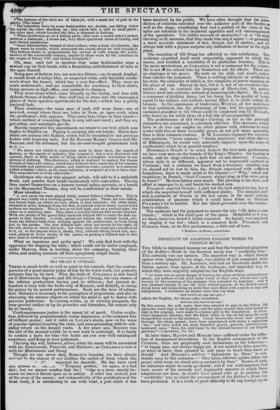GLI ORAZJ E CURIAZJ.
THERE is much truth as well as point in the remark, that the contem- poraries of a great master judge of him by his worst work, but posterity estimate him by his best. Thus the fame of CIMAROSA is now based on Ii Matrinwnio Segreto, and Gli Orazj e Curiazj, the very names of his inferior productions having past to oblivion ; but present de- traction is busy with the faults only of ROSSINI, and delights, in rating his genius by its poorest performances. Such are the laws of estima- tion. Distance is necessary to the perception of proportions, and also to obscuring the meaner objects on which the mind is apt to fasten with perverse preference. In viewing works, as in viewing prospects, the near ground strikes us by its poverties and blemishes, the remote only by its beauty. Contemporaneous justice is the rarest lot of merit. Undue exalta- tion, followed by proportionately undue depression, is the common fate of brilliant genius; and it rides on Luc AN'S storm, now on the wave of popular opinion touching the skies, and anon grounding with its sub- siding return on the deepest rocks. A few years ago, ROSSINI was the idol of the musical world; he is now sunk to contempt. It is hardy to confess a taste for him—his faults are run over with catalogued exactness, and flung at your judgment.
The long day will, however, arrive, when his name will be associated with his Sezniramide, Tancredi, and Barbiere ; as CIMAROSA'S now is with his Matrinzonio and Orazj.
Though we can never deny Rossien's beauties, we have always resieted to the utmost of our abilities the surfeit of them which has ,mpanied his discredit. He has been used anu abuse' " Toujour,-; perdrix," we agree, is a bad diet ; but we cannot confess that thei 4ridge is a crow, merely be- cause we have it thrust upon us to satiety. A relief has arrived, just at the close of the season; and independently of the gratification of the treat itself, it is satisfactory to see with what, a just relish it has been received by the public. We have often thought that the juris- diction of criticism extended over the audience part of the theatre as well as the stage, considering how vast a portion of the vices of the latter are referable to the depraved appetites and evil encouragement of the spectators. The child's account of an encore,*—i. e. "he sang the song so ill, mamma, that they made him sing it again,"—is generally a most accurate statement of fact, though not of motive ; and we always hail with a joyous surprise any indication of favour in the right place. The reception of Gli Orazj has afforded us this satisfaction. The audience acquitted itself most respectably, appeared to relish the music, and testified a sensibility of its particular beauties. This is the more meritorious, as CIMAROSA is not a"composer for the vulgar. He is not df the school who lay themselves out fcir effects. There are no claptraps in his music. He rests on his skill, and awaits rather than catches the judgment. There is nothing intricate or artificial in his style, the character of which is, the simplicity of power reposing on the grace of ease. Energy he has, but it is not of an excursive cha- racter; and, to continue the language of illustration, his genius throws itself into attitudes instead of launching into flights. He is not a composer of cistriking fancy, but his fancy has the quality of being equal to his subject, and content, having filled it, to abide within its bounds. In the expression of tenderness, WINTER, all but matchless in that sentiment, has the advantage of him ; but his appropriately- sustained grandeur in Gil Orazj could be surpassed only by Mozaar, who bears up his noble ideas on a full tide of accompaniment. The performance of Gli Orazj e Curiazj, so far as the principal characters are concerned, is extremely effective. The choruses, which have to do (we can employ no other phrase with reference to such work) with two or three beautiful pieces, do not yell more agreeably than is their common custom. If M. LAPORTE engaged the vocalists who proclaim "brave salmon," "dainty mackerel," and other delicue of Billingsgate, he would very materially improve upon the corps of vociferators which he at present employs. DONZELLI'S Orazio is in every respect the best male performance we have ever seen on the boards of the King's Theatre; his bearing is noble, and he sings without a fault that we can discover. CURIONI, whose style is so different, appeared not to ungraceful contrast as Curiazio ; hut a criticism we heard from a foreigner, standing near us, should not be lost to him, for, though expressed with sufficient homeliness, there is much point in the inquiry :—" Why," asked our neighbour, in French, "does CuitioNi always sing as if he were going to burst?" He does labour over much. The pleasing is his style, and effort is improper to it, and beside his modest aim. P15AR0NI enacted Orazia ; a part not the best suited to her, but in which she acquitted herself with sufficient ability. The mingled grief and rtsentment of Orazia in the last scene, is the most unlucky combination of passions which it could have fallen to Madame PISARONI'S lot to exhibit. But her talent prevailed over the tempta- tion to ridicule.
The audience had the judgment to encore the trio "Oh dolce e cam istante; " which is the chief gem of the opera. Delightful as it was, we have, however, heard it better executed. Its beauty was impaired by singing it too fast ;, which is a common fault. PISARONI and CURIONI were, on its first performance, a little out of tune.
* Mathews at Home, somewhere.


















 Previous page
Previous page